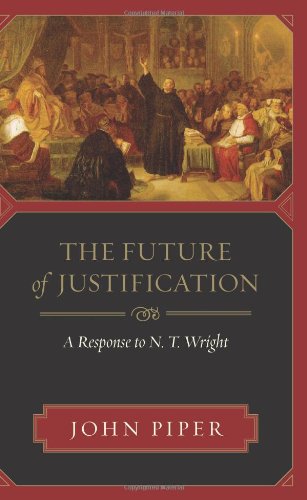A Book Summary from Books At a Glance
About the Author
John Piper (DTheol, University of Munich) is teacher and founder of desiringGod.org and chancellor of Bethlehem College and Seminary. He served for 33 years as pastor at Bethlehem Baptist Church in Minneapolis and is author of more than 50 books, including Desiring God, Don’t Waste Your Life, This Momentary Marriage, Bloodlines, and Does God Desire All to Be Saved?
Overview
John Piper summarizes and critiques the major lines of thought of the influential New Testament scholar N. T. Wright. Specifically, Piper deals with Wright’s views on the relationships between works, the law, justification, and the future in Paul. He appreciates much about Wright, but in the final analysis reasons that the New Perspective on Paul distorts the New Testament and endangers preaching.
Table of Contents
Introduction
On Controversy
1. Caution: Not All Biblical-Theological Methods and Categories Are Illuminating
2. The Relationship between Covenant and Law-Court Imagery for Justification
3. The Law-Court Dynamics of Justification and the Meaning of God’s Righteousness
4. The Law-Court Dynamics of Justification and the Necessity of Real Moral Righteousness
5. Justification and the Gospel: When Is the Lordship of Jesus Good News?
6. Justification and the Gospel: Does Justification Determine Our Standing with God?
7. The Place of Our Works in Justification
8. Does Wright Say with Different Words What the Reformed Tradition Means by “Imputed Righteousness”?
9. Paul’s Structural Continuity with Second-Temple Judaism?
10. The Implications for Justification of the Single Self-Righteous Root of “Ethnic Badges” and “Self-Help Moralism”
11. “That in Him We Might Become the Righteousness of God”
Conclusion
Appendix One: What Does It Mean That Israel Did Not “Attain the Law” Because She Pursued It “Not by Faith But as though It Were by Works”? Thoughts on Romans 9:30–10:4
Appendix Two: Thoughts on Law and Faith in Galatians 3
Appendix Three: Thoughts on Galatians 5:6 and the Relationship between Faith and Love
Appendix Four: Using the Law Lawfully: Thoughts on 1 Timothy 1:5–11
Appendix Five: Does the Doctrine of the Imputation of Christ’s Righteousness Imply That the Cross Is Insufficient for Our Right Standing with God?
Appendix Six: Twelve Theses on What It Means to Fulfill the Law: With Special Reference to Romans 8:4
Introduction
The topic of the book – justification by faith apart from works of the law – is a deadly serious issue which pastors particularly must approach as humble stewards of God’s truth. Getting the gospel right, and therefore avoiding the curse of Galatians 3:10, involves a message which brings sinners from death to life.
And yet N. T. Wright’s portrayal of the gospel is disfigured relative to the Bible’s own witness to God’s grace in Christ. In short, and to make the stakes clear from the outset, even if Wright’s own understanding were sound, his portrayal of the matter leaves readers without good news. “The lordship of Christ” does not help the sinner to stand righteous in the presence of God.
The English New Testament scholar and Anglican Bishop provided Piper with an 11,000-word response to the first draft. After interacting with Wright, Piper remains convinced that his “top-to-bottom rethinking of Paul’s theology” misses the mark, though there is much to commend him as a scholar and Christian leader in many respects.
The fulcrum for Wright is Romans 10:3: “Being ignorant of the righteousness of God and seeking to establish their own.” In Wright’ mind, this is an indication of a Jews-only covenant status alongside Paul’s conception. Re-reading Galatians in this light yielded a kind of “pre” New Perspective for Wright in the mid-seventies.
Piper then sets out a few flashpoints of Wright’s re-reading of Paul in light of his basic insight from Romans 10:3. Wright holds that the gospel is not about how one gets saved; rather, “it is about the proclamation of the lordship of Jesus Christ.” Furthermore, as a preview of issues to come in the book, Wright’s reading of Paul yields other potentially unsettling conclusions for traditional interpreters: justification is not how you become a Christian; it is not the gospel; we are not justified by believing in justification; the imputation of God’s own righteousness makes no sense at all; future justification is on the basis of the complete life lived; first century Judaism had nothing of the self-righteousness traditionally ascribed to it; and God’s righteousness is the same as his covenant faithfulness. As a traditional interpreter critiquing Wright, Piper aims to avoid the allures of traditionalism just as he avoids the appeal of the excitement of the present or, particular in this case, the allure of chasing the future, that which is just over the horizon coming into view.
On Controversy
Pastors are called to stand for the truth with guileless clarity. It’s often in polemical discussion that the church gains its real goal – peace and unity – as well as achieve its most lasting statements on what is good and true. Pauls’ great love hymn in 1 Corinthians 13 comes to us in the context of discord and correction. And so here the purpose is to speak forthrightly against error in love….
[To continue reading this summary, please see below....]The remainder of this article is premium content. Become a member to continue reading.
Already have an account? Sign In
Buy the books

The Future Of Justification: A Response To N. T. Wright